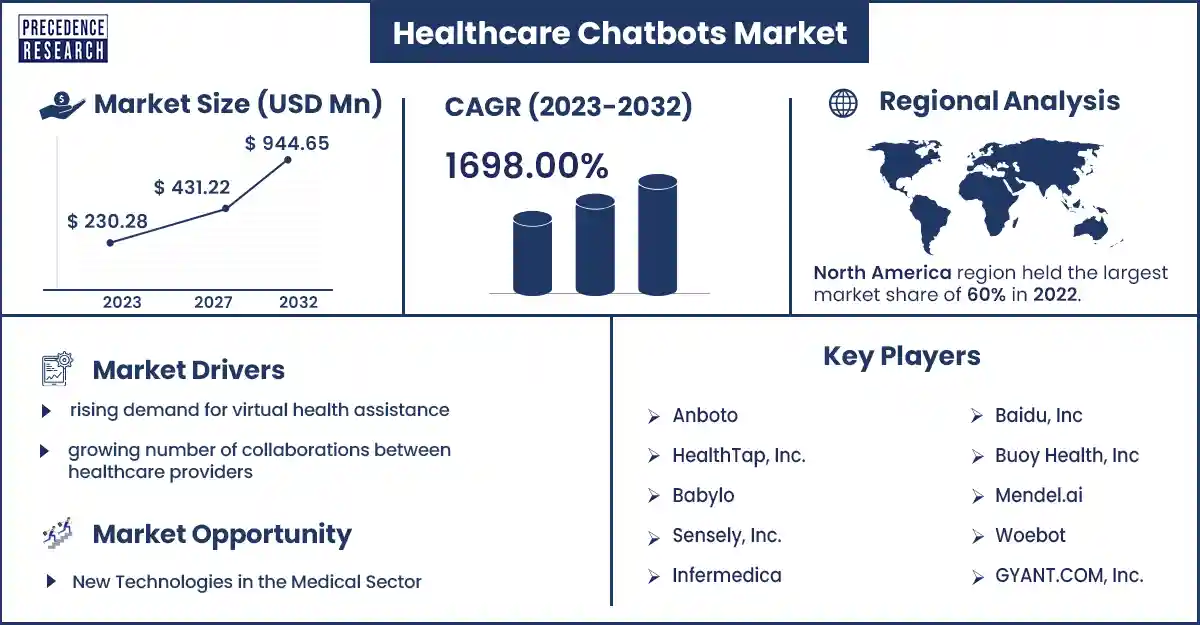December 2024
The global healthcare chatbots market size was exhibited at USD 230.28 million in 2023 and is estimated to grow around USD 944.65 million by 2032, growing at a CAGR of 16.98% from 2023 to 2032. The healthcare chatbots market is likely to expand in the upcoming years with the rising trend of social media-oriented chatbots across the globe. Alongside this, the growing demand for virtual health assistance services to monitor the health of patients is expected to foster market growth.

The healthcare chatbots market develops chatbots that are specialized to deal with healthcare professionals and patients to improve work and patient care. Hospitals and other healthcare facilities integrate chatbots for smooth connections with clients. The integration of chatbots in healthcare allows auto-answering facilities for patients according to their questions. These chatbots also assist doctors in addressing the concerns of patients who are minors in general.
Healthcare facilities can save a significant amount of time due to the integration of these chatbots, as it helps free up staff and allows them to concentrate on their main tasks. The healthcare market has experienced a substantial rise in demand for these digital assistants as they allow smoother interaction between doctors and patients, thereby increasing the accuracy and efficiency of professionals.
Rising demand for 24*7 services and adoption of smart devices fuels the market’s growth.
The healthcare sector has expanded rapidly due to advancements in internet connectivity and the rising adoption of smart devices. The availability of smart devices can allow patients and doctors to access information online and sit remotely. According to the HIMSS State of Healthcare report, 75% of U.S. healthcare systems had started investing in initiatives related to digital transformation in 2022. Also, the advent of the Internet of Medical Things (IoMT) has transformed patient care in hospitals by enabling doctors to schedule online appointments, allowing remote interaction between doctors and patients, and reducing waiting times to visit doctors. Thus, the adoption of smart devices with better internet facilities is likely to boost the growth of the healthcare chatbot market. In addition, healthcare chatbots allow round-the-clock availability and accessibility to various services and information related to healthcare. Due to the integration of chatbots, patients can ask questions, seek guidance, and receive personalized assistance anywhere by eliminating the need to wait in long queues to visit doctors.
However, the risk of inaccuracy in data security-related concerns is expected to restrain the growth of the healthcare chatbot market during the forecast period. These chatbots record sensitive information about patients, medical history, and other personal details. Thus, any breaches or mishandling of patient data can create trust-related issues in the minds of patients, thereby restraining market growth. Also, improper training of chatbots can lead to inaccuracy of information that, in turn, restrains the growth of the healthcare chatbots market.
| Report Coverage | Details |
| Market Revenue in 2023 | USD 230.28 Million |
| Projected Forecast Revenue by 2032 | USD 944.65 Million |
| Growth Rate from 2023 to 2032 | CAGR of 16.98% |
| Largest Market | North America |
| Base Year | 2022 |
| Forecast Period | 2023 to 2032 |
| Regions Covered | North America, Europe, Asia-Pacific, Latin America, and Middle East & Africa |
Recent Development by Mendel.AI
Recent Development by Baidu Inc
Asia Pacific is estimated to be the fastest-growing region in the healthcare chatbots market. The increasing usage of smart devices in these areas and the growing digitization of the healthcare industry are the primary drivers of market growth. For example, YugasaBot collaborated with the healthcare pilot program DIISHA (Digital Innovations Interventions for Sustainable Healthtech Action) in February 2023. Through this partnership, ASHA employees will have access to an AI-powered chatbot that can assist them with inquiries on a variety of health policies for people living in rural areas across India. Additionally, the rise in internet users and the expanding medical tourism trend both contribute to the market's growth.
North America dominated the global healthcare chatbots market in 2023. The market is mainly driven by the presence of key companies such as Google, Microsoft, Buoy Health (U.S.), Sensely (U.S.), Woebot (U.S.), X2AI (U.S.), and others, along with higher investments in research & development of healthcare sector. In July 2023, Google launched an AI chatbot for the healthcare sector named Med-PaLM 2. This launch was aimed at answering health-related queries and facilitating conversations between patients and doctors. Google started testing this medical AI-enabled chatbot in several hospitals in the USA, including the Mayo Clinic research hospital. Also, the growing demand for virtual healthcare services and increased prevalence of chronic illnesses, along with surging demand for patient engagement programs, had further accelerated the growth of the healthcare chatbot market in this region.
New Technologies in the Medical Sector
The healthcare industry has developed rapidly in the past decade due to advancements in medical science and related sectors. Modern technologies such as AI and cloud computing are being integrated into healthcare sectors. Also, the concept of cloud-based chatbots in the healthcare sector is an upcoming trend as it provides services such as scheduling appointments, checkup reminders, and monitoring therapy sessions. Thus, the integration of modern technologies in healthcare sectors is likely to create ample growth opportunities for the market players in the future.
Segment Covered in the Report
By Component
By Application
By Deployment
By End-User
Buy this Research Report@ https://www.precedenceresearch.com/checkout/2500
You can place an order or ask any questions, please feel free to contact at sales@precedenceresearch.com | +1 650 460 3308
December 2024
January 2025
January 2025
January 2025